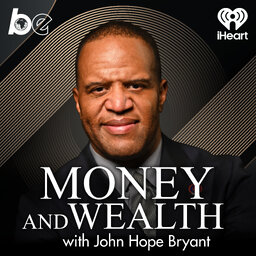How A City Works
In this special episode, John has a live conversation with Memphis Mayor Paul Young. They unpack what it takes to be the CEO of a city
In 1 playlist(s)
Money & Wealth With John Hope Bryant
John Hope Bryant- successful entrepreneur, executive and philanthropist –will dispense his trademark…Social links
Follow podcast
Recent clips

REPLAY: When Smart People Fail
1:06:23

Turning No Into a Lease
12:17

Built for the Storm: How to Protect, Survive & Thrive in Uncertain Times
54:29
 Money & Wealth With John Hope Bryant
Money & Wealth With John Hope Bryant